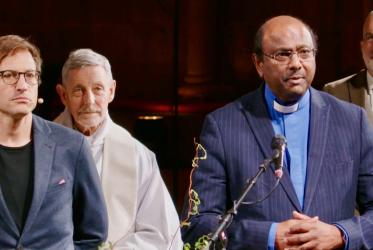A newly established ecumenical panel of economic experts seeks to develop advocacy strategies for churches working to realize ethical, just and sustainable systems of economics and finance.
The panel held its first meeting from 23 to 25 August in Bossey, Switzerland.
The Ecumenical Panel on a New Financial and Economic Architecture has been created by the World Council of Churches (WCC), the World Communion of Reformed Churches (WCRC), the Lutheran World Federation (LWF) and the Council for World Mission (CWM).
In its three-day meeting, the panel triggered dialogue on implementation of the São Paulo statement, a document jointly produced last year in Brazil by the WCC, WCRC and CWM.
The document, titled “São Paulo Statement: International Financial Transformation for the Economy of Life”, encourages visible actions ensuring social inclusion, gender justice and care for the environment while setting clear “limits to greed” and promoting an “economy of life”.
“The financial system must work for the people and not vice versa,” said Barry Herman, participant at the meeting and a visiting senior fellow at the Graduate Program in International Affairs of The New School in New York City.
Herman pointed out the significance of the financial transaction tax, calling it an issue to be addressed in order to translate the spirit of the São Paulo statement into action.
While some countries have introduced a tax on financial transactions and raised considerable financial resources, Herman stated that “campaigns are needed to increase tax payments by tax evaders, who are overwhelmingly big companies and the more affluent segments of society.”
“Tax evasion is not a crime against a faceless bureaucracy; it is a crime against the citizens who pay more taxes as a result of the non-payment by others and receive fewer and poorer quality public services as a consequence.”
“The financial system should stop abetting these crimes,” he added.
Gerhard Wegner of the Evangelical Church in Germany (EKD) contributed Christian perspectives on how the São Paulo statement can help create a “civil economy instead of an unmoral economy”.
Calling ecological disasters one of the major challenges faced by communities, Wegner said that a “transformative investment” is needed on a global scale to seek environmental justice.
“In order to mobilize the required capital for transformative investment, the markets, especially the financial markets, have to be morally reframed – or, as it is said in the São Paulo statement, ‘re-embedded’, and for this we have to develop the concept of a civil economy,” he said.
Nora Castenada, first president of the Women’s Development Bank in Venezuela, appointed by the late president Hugo Chavez, highlighted the importance of gender aspects in efforts for a just economy.
“Women often live at the front of the poverty line. To address economic injustices, it is important to incorporate gender perspectives, a principle also outlined in the São Paulo statement,” said Castenada.
“We have tried to implement this principle in our projects in Banmujer, where we catered to women’s demands for microcredits. With such support women can be part of a process aimed at ending poverty that leads to ethical economic systems,” she said.
Castenada said that projects which address the needs of women have a lasting impact on Venezuelan society, where a majority of families living in poor conditions are headed by women. She expressed her wish to work with churches to implement the São Paulo statement, saying that such collaborations affirm “churches’ vision of siding with the poor”.
In the meeting, Dr Rogate Mshana, the WCC programme executive for Poverty, Wealth and Ecology, explained the mandate of the ecumenical panel.
He said, “The panel will advise the WCC, WCRC, CWM and LWF on ways of implementing proposals from the São Paulo statement that can carry forward the valuable work of the Commission of Experts on Reforms of the International Monetary and Financial System, chaired by Prof. Joseph Stiglitz.”
These proposals, he said, will aim at promoting justice in the economy and ecology, a significant issue for the churches around the world.
Rev. Dr Olav Fykse Tveit, general secretary of the WCC, Rev. Dr Setri Nyomi, general secretary of the WCRC, Ralston Deffenbaugh of the LWF and Rev. Dr Collin I. Cowan, the CWM general secretary, addressed the meeting. They appreciated the commitment of the panellists to advise the ecumenical organizations on their response to the important issue of economic justice.
São Paulo Statement: International Financial Transformation for the Economy of Life




